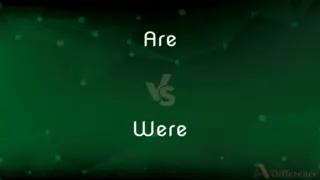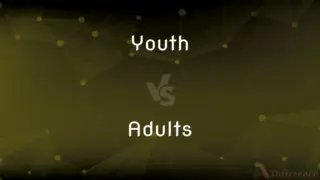Conflict vs. Controversy — What's the Difference?
By Tayyaba Rehman — Published on November 29, 2023
Conflict is a direct clash or opposition, often resulting from differing needs or goals; Controversy is prolonged public disagreement or heated discussion about a specific topic.

Difference Between Conflict and Controversy
Table of Contents
ADVERTISEMENT
Key Differences
Conflict refers to a direct opposition between individuals or groups, often driven by diverging interests, beliefs, or values. These clashes can be verbal, emotional, or physical in nature. On the other hand, Controversy arises when there's public disagreement on a particular issue, topic, or idea, often spawning debates and discussions. Conflict typically necessitates resolution or intervention to achieve harmony, while Controversy can persist without immediate resolution, continuing to provoke thought and debate.
Conflict can arise in various settings, from personal relationships to international relations. When individuals or groups encounter differing beliefs or goals, it might lead to disputes or even violence. Controversy, however, is more about topics that generate divided opinions and extensive discussions, often without a definitive right or wrong answer. Subjects like politics, religion, or societal norms often spark controversies.
Conflict tends to have more direct and immediate impacts on the parties involved. It can result in visible tension, stress, or harm if not addressed. Controversy, conversely, might not directly affect individuals but can shape public opinion, influence decision-making, or drive societal change. While conflicts seek solutions or compromises, controversies often require public discourse and understanding.
A crucial distinction between Conflict and Controversy is their nature and scope. While conflict might be localized to specific parties, controversy often has a broader reach, affecting larger audiences or entire communities. Moreover, while conflicts might be short-lived and resolvable, controversies can last for extended periods, defining eras or movements.
Comparison Chart
Nature
Direct opposition between parties
Prolonged public disagreement on a topic
ADVERTISEMENT
Origins
Differing beliefs, needs, or goals
Divergent opinions on specific issues
Resolution
Often requires intervention or compromise
Might continue without definitive resolution
Scope
Typically localized
Can have a broader reach, affecting many people
Impact
Immediate tension or harm
Shapes public opinion and drives discourse
Compare with Definitions
Conflict
A difference that prevents agreement.
There's a Conflict between the two reports.
Controversy
Public disagreement about a debated topic.
The new law sparked a lot of Controversy among citizens.
Conflict
An incompatibility between actions, principles, or goals.
There's a Conflict of interest in his business dealings.
Controversy
A prolonged discussion marked by opposing views.
The book's subject became a major Controversy.
Conflict
A struggle or disagreement between parties.
Their Conflict stemmed from differing viewpoints.
Controversy
A topic causing division or dispute in public discourse.
The Controversy surrounding the film led to widespread discussions.
Conflict
A direct clash between opposing forces or ideas.
The two countries are in Conflict over territorial boundaries.
Controversy
A dispute where opinions vary.
The theory remains a point of Controversy in the scientific community.
Conflict
A state of open, often prolonged fighting; a battle or war.
Controversy
A contentious issue that sparks debate.
The election results were a source of Controversy.
Conflict
A state of disagreement or disharmony between persons or ideas; a clash
A conflict over water rights.
Controversy
A dispute, especially a public one, between sides holding opposing views.
Conflict
(Psychology) An emotional or mental disturbance resulting from the opposition or simultaneous functioning of mutually exclusive impulses, desires, or tendencies.
Controversy
The act or practice of engaging in such disputes
Writers skilled at controversy.
Conflict
Opposition between characters or forces in a work of drama or fiction, especially when motivating or shaping the action of the plot.
Controversy
A debate or discussion of opposing opinions; (generally) strife.
Conflict
To be in or come into opposition; differ.
Controversy
Contention; dispute; debate; discussion; agitation of contrary opinions.
This left no room for controversy about the title.
A dispute is commonly oral, and a controversy in writing.
Conflict
(Archaic) To engage in warfare.
Controversy
Quarrel; strife; cause of variance; difference.
The Lord hath a controversy with the nations.
Conflict
A clash or disagreement, often violent, between two or more opposing groups or individuals.
The conflict between the government and the rebels began three years ago.
Controversy
A suit in law or equity; a question of right.
When any man that had a controversy came to the king for judgment.
Conflict
An incompatibility, as of two things that cannot be simultaneously fulfilled.
I wanted to attend the meeting but there's a conflict in my schedule that day.
Controversy
A contentious speech act; a dispute where there is strong disagreement;
They were involved in a violent argument
Conflict
(intransitive) To be at odds (with); to disagree or be incompatible
Conflict
(intransitive) To overlap (with), as in a schedule.
Your conference call conflicts with my older one: please reschedule.
It appears that our schedules conflict.
Conflict
A striking or dashing together; violent collision; as, a conflict of elements or waves.
Conflict
A strife for the mastery; hostile contest; battle; struggle; fighting.
As soon as he [Atterbury] was himself again, he became eager for action and conflict.
An irrepressible conflict between opposing and enduring forces.
Conflict
To strike or dash together; to meet in violent collision; to collide.
Fire and water conflicting together.
Conflict
To maintain a conflict; to contend; to engage in strife or opposition; to struggle.
A man would be content to . . . conflict with great difficulties, in hopes of a mighty reward.
Conflict
To be in opposition; to be contradictory.
The laws of the United States and of the individual States may, in some cases, conflict with each other.
Conflict
An open clash between two opposing groups (or individuals);
The harder the conflict the more glorious the triumph
Police tried to control the battle between the pro- and anti-abortion mobs
Conflict
Opposition between two simultaneous but incompatible feelings;
He was immobilized by conflict and indecision
Conflict
A hostile meeting of opposing military forces in the course of a war;
Grant won a decisive victory in the battle of Chickamauga
He lost his romantic ideas about war when he got into a real engagement
Conflict
A state of opposition between persons or ideas or interests;
His conflict of interest made him ineligible for the post
A conflict of loyalties
Conflict
An incompatibility of dates or events;
He noticed a conflict in the dates of the two meetings
Conflict
Opposition in a work of drama or fiction between characters or forces (especially an opposition that motivates the development of the plot);
This form of conflict is essential to Mann's writing
Conflict
A disagreement or argument about something important;
He had a dispute with his wife
There were irreconcilable differences
The familiar conflict between Republicans and Democrats
Conflict
Be in conflict;
The two proposals conflict!
Conflict
Go against, as of rules and laws;
He ran afould of the law
This behavior conflicts with our rules
Conflict
A state of mental or emotional strain.
She's facing an internal Conflict about her career choices.
Common Curiosities
Can a Controversy lead to a Conflict?
Yes, differing opinions in a Controversy can escalate into a Conflict.
Are Conflicts always negative?
No, some Conflicts can lead to positive change or better understanding.
What subjects often lead to Controversy?
Politics, religion, and societal norms often spark Controversy.
Can a Conflict be silent?
Yes, internal or unexpressed disagreements are silent Conflicts.
How can Conflict be resolved?
Through communication, compromise, or intervention.
Can Controversy be constructive?
Yes, it can foster discussion and bring about awareness.
Are Conflict and Controversy the same thing?
No, Conflict is a direct opposition, while Controversy is a public disagreement on a topic.
Why do Controversies persist?
They often lack clear right or wrong answers, leading to prolonged debate.
Can individuals experience internal Conflict?
Yes, individuals can face internal struggles or dilemmas.
Is Controversy essential for societal progress?
It can be; Controversy often drives discourse and can lead to change.
How are Conflicts and Controversies related?
While distinct, Controversies can sometimes lead to Conflicts.
Do Controversies always need resolution?
Not always; some Controversies continue to shape discourse without resolution.
Are all Conflicts violent?
No, Conflicts can be verbal or emotional, not just physical.
Can art and literature spark Controversy?
Absolutely, they often challenge norms or present controversial viewpoints.
Share Your Discovery

Previous Comparison
Are vs. Were
Next Comparison
Youth vs. AdultsAuthor Spotlight
Written by
Tayyaba RehmanTayyaba Rehman is a distinguished writer, currently serving as a primary contributor to askdifference.com. As a researcher in semantics and etymology, Tayyaba's passion for the complexity of languages and their distinctions has found a perfect home on the platform. Tayyaba delves into the intricacies of language, distinguishing between commonly confused words and phrases, thereby providing clarity for readers worldwide.













































